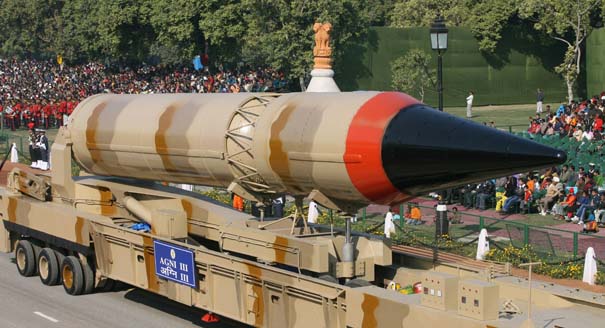Source: Carnegie Moscow Center Working Paper
 Nuclear Weapons and Strategic Security in South AsIn the new issue of the Carnegie Moscow Center's Working Papers series, Peter Topychkanov analyzes South Asian regional strategic security issues, the role of nuclear weapons in Indo-Pakistani relations, the external and internal factors shaping these countries’ nuclear postures, and security-enhancing efforts emanating from inside and outside the region.
Nuclear Weapons and Strategic Security in South AsIn the new issue of the Carnegie Moscow Center's Working Papers series, Peter Topychkanov analyzes South Asian regional strategic security issues, the role of nuclear weapons in Indo-Pakistani relations, the external and internal factors shaping these countries’ nuclear postures, and security-enhancing efforts emanating from inside and outside the region.
Topychkanov describes the strategic security situation in South Asia as rather unstable. Among the issues are: a high risk of conflict between India and Pakistan caused by cross-border terrorism, accidents with nuclear weapons in both states, the Kashmir dispute, and the problem of sharing water from the Indus river. Major efforts to enhance regional security must be made by India and Pakistan. The author also argues that third countries, international organizations, and nonproliferation regimes can play a positive role as well.
According to Topychkanov, both nuclear optimists and pessimists agree that nuclear weapons proliferation in South Asia will not lead to a deliberate outbreak of large-scale war. Neither Indian nor Pakistani leaders wish to initiate a conflict that could end in a nuclear exchange with disastrous consequences. Still, a catastrophic conflict could occur even though neither the Indians nor the Pakistanis intend to start a nuclear war, and all measures must be taken to prevent it.
The author concludes that India and Pakistan should be engaged in nonproliferation regimes on a nondiscriminatory basis (IAEA, NSG, MTCR, etc.). Engagement would be in the interest of India and Pakistan and would set a good example for the nuclear threshold states. The incentives of nuclear cooperation must be made conditional on acceptance of NPT commitments and IAEA safeguards by recipient states.
